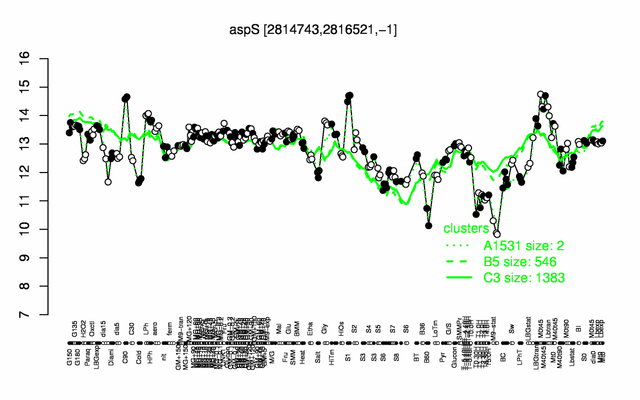Difference between revisions of "AspS"
| Line 123: | Line 123: | ||
* '''Additional information:''' | * '''Additional information:''' | ||
** belongs to the 100 [[most abundant proteins]] {{PubMed|15378759}} | ** belongs to the 100 [[most abundant proteins]] {{PubMed|15378759}} | ||
| + | ** number of protein molecules per cell (minimal medium with glucose and ammonium): 1584 {{PubMed|24696501}} | ||
| + | ** number of protein molecules per cell (complex medium with amino acids, without glucose): 6801 {{PubMed|24696501}} | ||
=Biological materials = | =Biological materials = | ||
Revision as of 09:49, 17 April 2014
- Description: aspartyl-tRNA synthetase
| Gene name | aspS |
| Synonyms | |
| Essential | yes PubMed |
| Product | aspartyl-tRNA synthetase |
| Function | translation |
| Gene expression levels in SubtiExpress: aspS | |
| Metabolic function and regulation of this protein in SubtiPathways: aspS | |
| MW, pI | 65 kDa, 4.654 |
| Gene length, protein length | 1776 bp, 592 aa |
| Immediate neighbours | bsrA, hisS |
| Sequences | Protein DNA DNA_with_flanks |
Genetic context 
This image was kindly provided by SubtiList
| |
Expression at a glance PubMed
| |
Contents
Categories containing this gene/protein
translation, essential genes, phosphoproteins, most abundant proteins
This gene is a member of the following regulons
The gene
Basic information
- Locus tag: BSU27550
Phenotypes of a mutant
essential PubMed
Database entries
- BsubCyc: BSU27550
- DBTBS entry: no entry
- SubtiList entry: [1]
Additional information
The protein
Basic information/ Evolution
- Catalyzed reaction/ biological activity: ATP + L-aspartate + tRNA(Asp) = AMP + diphosphate + L-aspartyl-tRNA(Asp) (according to Swiss-Prot)
- Protein family: class-II aminoacyl-tRNA synthetase family (according to Swiss-Prot)
- Paralogous protein(s):
Extended information on the protein
- Kinetic information:
- Modification: phosphorylated on ser/ thr/ tyr PubMed
- Effectors of protein activity:
Database entries
- BsubCyc: BSU27550
- UniProt: O32038
- KEGG entry: [2]
- E.C. number: 6.1.1.12
Additional information
Expression and regulation
- Regulatory mechanism:
- T-box: RNA switch, transcriptional antitermination PubMed
- Additional information:
- belongs to the 100 most abundant proteins PubMed
- number of protein molecules per cell (minimal medium with glucose and ammonium): 1584 PubMed
- number of protein molecules per cell (complex medium with amino acids, without glucose): 6801 PubMed
Biological materials
- Mutant:
- Expression vector:
- lacZ fusion:
- GFP fusion:
- two-hybrid system:
- Antibody:
Labs working on this gene/protein
Your additional remarks
References